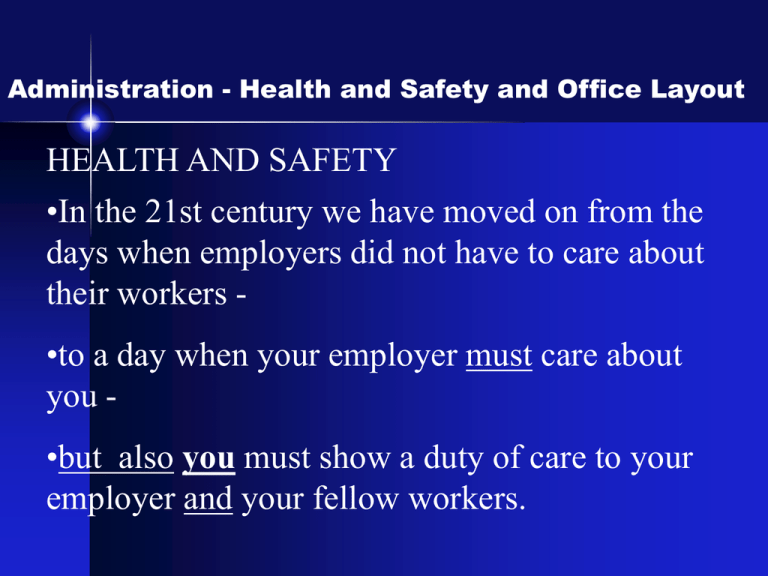Health and Safety - Coltness High School
advertisement

Administration - Health and Safety and Office Layout HEALTH AND SAFETY •In the 21st century we have moved on from the days when employers did not have to care about their workers •to a day when your employer must care about you •but also you must show a duty of care to your employer and your fellow workers. Administration - Health and Safety and Office Layout FAILURE TO SO DO COULD LEAD TO YOU BEING JAILED! Administration - Health and Safety and Office Layout HEALTH AND SAFETY •WHY? •We must take care of our own safety •that of our working colleagues •and that of our employer and employer’s property! Administration - Health and Safety and Office Layout HEALTH AND SAFETY •WHY? •AS IF WE DO NOT WE ARE BREAKING ONE OR MORE LAWS ON EMPLOYMENT LEGISLATION/HEALTH AND SAFETY - AND CAN BE PUT IN PRISON! Administration - Health and Safety and Office Layout HEALTH AND SAFETY •Various laws are currently IN FORCE (currently LAW) and have to be followed. •A lot of employment law is COMMON SENSE. For example, HEALTH AND SAFETY REGULATIONS There exist many pieces of industrial legislation governing: •Employers’ responsibility for the health and safety of their employees •Employers’ responsibility for the health and safety of members of the general public •But, just as importantly: HEALTH AND SAFETY REGULATIONS There exist many pieces of industrial legislation governing: •Employees’ responsibility for their own health and safety, and •Employees’ responsibility for the health and safety of their fellow workers. HEALTH AND SAFETY REGULATIONS •The basis of British Health and Safety Law is the Health and Safety at Work etc Act 1974 •This sets out the general duties which EMPLOYERS have towards EMPLOYEES and MEMBERS OF THE PUBLIC and •That EMPLOYEES have to THEMSELVES and to EACH OTHER. HEALTH AND SAFETY REGULATIONS •There are many Acts, over-and-above the Health and Safety at Work Act, which apply across the full range of workplaces. •We will be concentrating on only 4 of these: •The Health and Safety at Work etc Act 1974 (HASAWA), HEALTH AND SAFETY REGULATIONS •The Workplace (Health, Safety and Welfare) Regulations 1992 •Reporting of Injuries, Diseases and Dangerous Occurrences Regulations 1995 (RIDDOR) •and HEALTH AND SAFETY REGULATIONS •The Health and Safety at Work etc Act 1974 (HASAWA) includes the Offices, Shops and Railway Premises Act 1963. •This Act is very wide ranging and some of the groups of coverage - and specific coverage of the Act - are given next - TOILETS Kept clean. Maintained. Drinking water available.Soap, hot and cold and towels available. FIRE SAFETY Extinguishers available. Exits clearly marked. Regular fire drills. Evacuation procedures displayed. TEMPERATURE o Minimum 60 F after one hour. Opening windows or suitable ventilation required. Office, Shops and Railway Premises Act 1963 and HASAWA 1974 FIRST AID SPACE Adequate space for each person. Storage space for workclothes. Box to be provided. Trained First Aiders to be available. LIGHTING Natural or artificial - but sufficient. CLEANLINESS Floors and corridors to be kept clean, clear, level and unbroken. SEATING Adequate seating must be provided. HEALTH AND SAFETY REGULATIONS •Who is responsible for what? •An employee must: •Take care of their own health and safety •Take care of other people’s health and safety •Work with their employer to maintain health and safety (eg attending training courses etc) HEALTH AND SAFETY REGULATIONS •Who is responsible for what? •An employer must: •Make sure that the workplace is safe •Look after your welfare (eg health checks) and control levels of hazards (eg noise, fumes etc) •Provide first aid facilities HEALTH AND SAFETY REGULATIONS •Keep records of accidents and injuries in an Accident Log •Prepare health and safety policy and inform workers of this HEALTH AND SAFETY REGULATIONS •An employee must: •Take care not to damage equipment but report any damage you notice - right away! •Not have liquids near electrical equipment of any kind. HEALTH AND SAFETY REGULATIONS •However, if your employer, yourself and your fellow workers maintain good working practices then this should help greatly. •For example, by: •Not blocking passageways •Keeping all work areas clean and tidy HEALTH AND SAFETY REGULATIONS •Another Act which we need to heed is the Health and Safety (Display Screen Equipment) Regulations 1992. •Here, again, both employees and employers have a share in ensuring that these regulations are met and that the working environment is that much safer as a result. HEALTH AND SAFETY REGULATIONS •For the Employer: •Ensuring that the workstation and equipment meet minimum requirements •Ensuring employees have built-in BREAKS or CHANGES IN ACTIVITY •Training the workforce in health and safety HEALTH AND SAFETY REGULATIONS •Providing eyesight tests (and spectacles) if these are needed for computer work •Providing information about the Regulations eg posture safety, need for anti-glare screens etc •Checking that the equipment being used is safe HEALTH AND SAFETY REGULATIONS •For the Employee: •Making full use of all Display Screen adjustments eg colour, contrast, tilt angle, anti-glare screen and your seating position relative to the keyboard and screen HEALTH AND SAFETY REGULATIONS •Avoiding Health Hazards - adjusting seat height and seat back for comfort and posture, using foot rest if provided, wrist rest if provided and taking regular breaks in activity. HEALTH AND SAFETY REGULATIONS •The RIDDOR Regulations (Reporting of Injuries, Diseases and Dangerous Occurrences Regulations 1995) requires employers to report certain injuries, accidents or incidents within 7-10 days to the offices of the Health and Safety Executive or face being fined for failure to Report. HEALTH AND SAFETY REGULATIONS •The Health and Safety (First Aid) Regulations 1981 require that •Employers must provide enough people qualified in first aid for their business, and •That any such training and qualifications are approved by the Health and Safety Executive.











